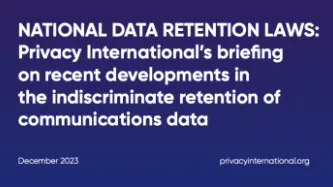Advanced Search
Content Type: Examples
In November 2023, as protests over the Israel-Hamas war ramped up, the UK's Met Commissioner announced police would analyse social media and use facial recognition searches to identify and detain "troublemakers" committing hate crimes or supporting banned terror organisations. To date, 70-80 suspects have been arrested in London over hate crimes relating to the conflict.https://www.standard.co.uk/news/london/palestine-israel-protests-met-police-mark-rowley-liverpool-street-station-b1117686.…
Content Type: Examples
Between October 7 and December 4 2023 the New York City Police Department used drones at least 13 times to make 239 arrests at pro-Palestine protests, and more than tripled its use of drones in the previous year. Police have handed over the drone footage as evidence in 158 cases where protesters have been criminally charged. Critics say the NYPD, which in five years has incresaed its fleet of drones from 13 to 30, is increaingly behaving like a national intelligence agency. Current New York…
Content Type: Examples
Tensions at educational institutions across the US following the the opening of the Israel-Hama conflict in Gaza on October 7 are accompanied by student concerns, particularly among those protesting the mass killing of Palestinians, that their speech is being intensely policed. Conscious of the prejudice and surveillance directed against them in the years following the 9/11 attacks in 2001, Muslims in particular feel unsafe and under pressure to appear less identifiable. That surveillance…
Content Type: Examples
New York state governor Kathy Hochul has announced $75 million in additional funding for surveillance technology and staff to be used to target pro-Palestinian protesters and activists, describing the move as fighting anti-semitism. The news came a day after the Biden administration announced new support for campus surveillance programmes. Hochul also provided for a judge to review policies and procedures relating to antisemitism at City University of New York - but not Islamophobia.https://www…
Content Type: Advocacy
AI-powered employment practices: PI's response to the ICO's draft recruitment and selection guidance
The volume of data collected and the methods to automate recruitment with AI poses challenges for the privacy and data protection rights of candidates going through the recruitment process.Recruitment is a complex and multi-layered process, and so is the AI technology intended to service this process at one or all stages of it. For instance, an AI-powered CV-screening tool using natural language processing (NLP) methods might collect keyword data on candidates, while an AI-powered video…
Content Type: Examples
New security guidelines are designed to let the incoming government in Argentina crack down on expected protests after it devalued the country's currency by more than 50% in December 2023 as part of a plan to cut the national deficit and bring down inflation. The guidelines include a plan to identify protesting individuals and organisations via "video, digital, or manual" means and then bill them for the cost of supplying security personnel to police their demonstrations. Law enforcement at bus…
Content Type: Examples
The European Legal Support Centre has documented 24 incidents in which UK-based pro-Palestinian academic staff and students, especially Palestinians, and people of colour, have been reported to the police, the Prevent counter-terrorism strategy, and university disciplinary committees. Overall, ELSC has recorded 87 incidents against Palestinian advocacy in the UK since the October 7 beginning of Israel's action in Gaza. Some of the 24 cases led to threats of legal action and police violence.…
Content Type: Examples
The UK government has proposed legislation to allow police to search the database of driver's licence photos with facial recognition software to identify criminal suspects. People applying for licences have not consented to being included in this "permanent police lineup", the victims of mistakes may have little opportunity to argue back, the systems are flawed, and the consequences for Britain's culture of policing-by-consent are unknown.https://www.theguardian.com/uk-news/2023/dec/20/…
Content Type: Examples
The newly appointed DGP in the Indian state of Uttar Pradesh has said he intends to focus on people-centric and artificial intelligence-based predictive policing to identify high-risk areas so that police can anticipate and prevent crimes. He has also named cybercrime as a priority. Uttar Pradesh, which holds about 17% of India's population, is ranked 20th in terms of crime rates, and has a conviction rate of 70.8, nearly three times the national average of 25.3.https://timesofindia.indiatimes.…
Content Type: Examples
At recent rallies, London's Metropolitan police have ramped up use of facial recognition technology to scan pro-Israeli and pro-Palestinian protesters, claiming that some of the signs, banners, and chants heard at these protests stray into religious or racial offences. Following the protests held the second weekend in January 2024, the police launched about 30 investigations.https://www.biometricupdate.com/202401/london-police-deploy-facial-recognition-during-palestine-and-israel-…
Content Type: Examples
Leaked messages show that Shirion Collective, a pro-Israel surveillance network that claims its "Maccabee" AI tool can identify and track targets, is branching out from the UK to Australia. The group, like others such as Canary Mission, claims to fight antisemitism, mostly by identifying individuals online. The results place the named individuals at risk of attacks and intimidate activists and academics.https://www.theguardian.com/media/2024/jan/30/pro-israel-group-shirion-collective-australian…
Content Type: Examples
Police in Queensland photographed peaceful pro-Palestinian protesters in Logan in December 2023 and recorded the licence plate numbers of cars displaying Palestinian flags. When politicians and others objected, police defended the practice by saying that some threats require "significant threat and risk assessments" and that recording people and vehicles using body-worn cameras, mobile devices, and other means is normal practice.https://www.theguardian.com/australia-news/2024/jan/19/queensland-…
Content Type: Examples
The FBI is using databases of location data and facial recognition technology to automate finding and charging participants in the January 6 insurrection at the Capitol who have so far escaped identification and arrest. Few legal protections stand in the way of this type of digital surveillance. The first of the more than 1,200 insurrectionists charged to date were those whose social media postings or tips from third parties made them obvious suspects. More recently, the FBI has found new…
Content Type: Examples
Over 60 US cities and counties use Fusus, a "police technology platform that merges public and private cameras with predictive policing and other surveillance tools". Private surveillance camera owners are encouraged to enroll in a police-led program that enables the police to control these cameras. The result is an expanstion of policed spaces and integration of all private and public surveillance systems in one comprehensive dragnet. And Fusus' platform does not stop at integrating CCTV…
Content Type: Examples
Notorious military tech company Anduril is pushing its technology to the border surveillance market. Along the US-Mexico border, its surveillance towers "use an artificial intelligence system called Lattice to autonomously identify, detect and track “objects of interest”, such as humans or vehicles. The cameras pan 360 degrees and can detect a human from 2.8km away." But border surveillance technology has been shown to lead people to lengthier and more dangerous routes as they seek to avoid…
Content Type: Report
Over the past years, data retention regulation imposing generalised and indiscriminate data retention obligations to telecommunication companies and Internet service provides has been introduced in various jurisdictions across the world. As the data retention practices across the world have evolved this new report is an attempt to shed some light on the current state of affairs in data retention regulation across ten key jurisdictions. Privacy International has consulted with human…
Content Type: Advocacy
In PI’s view the Revised Draft is a significant step back to the already weakened previous draft. Among the many concerns that we highlight in this analysis, we are particularly dismayed by the deletion of a principle on privacy, data protection and confidentiality in Article 3. In all previous drafts, the inclusion of such provision reflected the importance that data protection and privacy plays in any effective, modern public health policies. Failing to keep a specific principle on privacy…
Content Type: Report
The methodology employed for this report consists primarily of in-depth interviews held with grassroots political workers and representatives of collectives. The researchers interviewed 14 individuals from various social justice causes such as womens’ rights, climate change, transgender rights, students’ rights and the right to universal internet access in Pakistan. The experiences they have shared with the interviewers along with the real-time developments in the country’s law and order…
Content Type: Advocacy
Why the EU AI Act fails migration
The EU AI Act seeks to provide a regulatory framework for the development and use of the most ‘risky’ AI within the European Union. The legislation outlines prohibitions for ‘unacceptable’ uses of AI, and sets out a framework of technical, oversight and accountability requirements for ‘high-risk’ AI when deployed or placed on the EU market.
Whilst the AI Act takes positive steps in other areas, the legislation is weak and even enables dangerous systems in the…
Content Type: Advocacy
Generative AI models are based on indiscriminate and potentially harmful data scrapingExisting and emergent practices of web-scraping for AI is rife with problems. We are not convinced it stands up to the scrutiny and standards expected by existing law. If the balance is got wrong here, then people stand to have their right to privacy further violated by new technologies.The approach taken by the ICO towards web scraping for generative AI models may therefore have important downstream…
Content Type: Advocacy
Privacy International has joined several UK civil society organisations from across sectors in expressing our deep concerns regarding the financial surveillance powers proposed in the UK Data Protection and Digital Information Bill (DPDI Bill). Specifically outlined in Clause 128 and Schedule 11, these measures introduce mass algorithmic surveillance aimed at scrutinizing bank and third-party accounts to purportedly detect welfare fraud and errors. In other words, the Department for Work…
Content Type: News & Analysis
In a significant and forceful decision, on 1 March 2024 the UK's Data Protection Authority found that the UK Government's GPS tagging of migrants arriving to the UK by small boats and other "irregular" routes was unlawful.
The decision comes as a result of Privacy International's complaint filed in August 2022 against the GPS tagging policy, which alleged widespread and significant breaches of privacy and data protection law. Our complaint relied extensively on anonymous testimonies of…
Content Type: Advocacy
Privacy International had suggested the Human Rights Committee consider the following recommendations for the UK government:Review and reform the IPA 2016 to ensure its compliance with Article 17 of the ICCPR, including by removing the powers of bulk surveillance;Abandon efforts to undermine the limited safeguards of the IPA 2016 through the proposed Investigatory Powers Amendment Bill;Refrain from taking any measures that undermine or limit the availability of encrypted communications or other…
Content Type: Advocacy
BackgroundThe Snowden revelations and subsequent litigation have repeatedly identified unlawful state surveillance by UK agencies. In response, the UK Parliament passed the highly controversial Investigatory Powers Act 2016 (IPA), which authorised massive, suspicionless surveillance on a scale never seen before, with insufficient safeguards or independent oversight.Privacy International led legal challenges to this mass surveillance regime both before and after the Act became law. The Act…
Content Type: Key Resources
We have been tracking the use of EdTech around the world to better understand the trends and shortcomings and strengthen ours and others understanding regarding these issues.This page will be updated as we find more examples and stories about EdTech from all around the world.
Content Type: Examples
Some UK schools have bought and installed sensors in toilets that 'actively listen' to pupils' conversations to try to detect keywords spoken by pupils. The sensors are being sold to detect vaping, bullying, and other problems. However, privacy campaigners say these sensors are potentially a safeguarding issue, a violation of children's rights, and are likely to be unlawful. The sensors do not record or save any conversations, but send alerts to staff when triggered. Not all the schools…
Content Type: Report
This policy paper seeks to determine the potential for the existing international private military and security companies (PMSC) regulatory framework to support more effective regulation of surveillance services provided by the private sector.In order to achieve this, and given that this paper addresses an issue that is at the intersection of two domains, it seeks to establish a common language and terminology between security sector governance and surveillance practitioners.In…
Content Type: Examples
A coalition of 33 civil rights, disabilities, privacy, and education advocacy groups are pushing the state of Florida to stop developing the Florida Schools Safety Portal, a database of detailed information about students for the claimed purpose of preventing school shootings, calling it a "massive surveillance effort". Governor Ron DeSantis has backed the database, which has been delayed since early 2019, when it was intended to become operational. The groups complain that the planned database…












